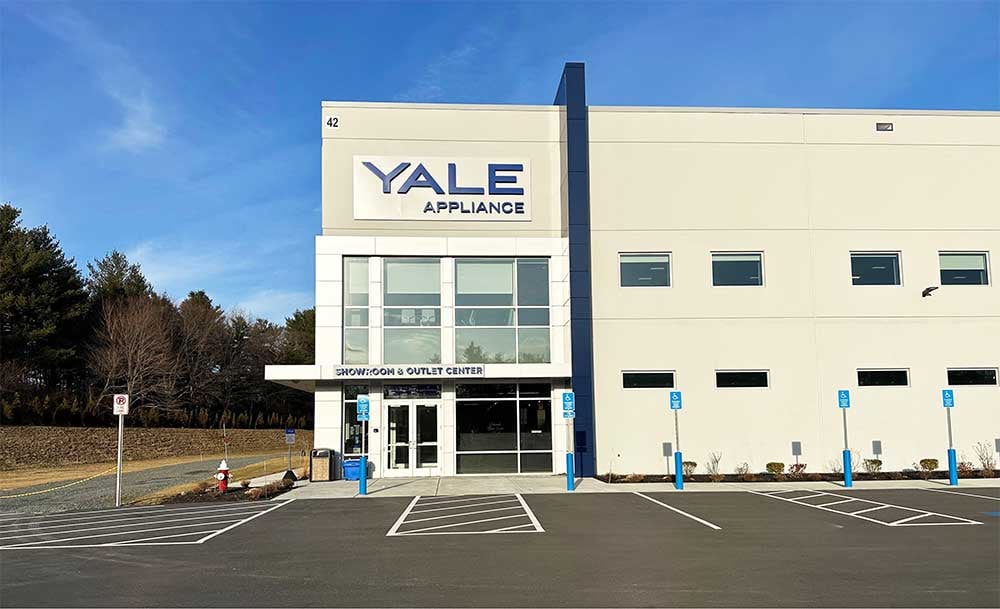Are Appliance Extended Warranties Worth It in 2026?
September 3rd, 2025 | 8 min. read

TL;DR: Are Appliance Extended Warranties Worth It in 2026?
- Mostly no: Third-party plans outsource cheap, slow repairs.
- Sometimes yes: Counter-depth fridges, 48″ pro ranges, some front-load washers, and induction ranges.
- Dealer matters most: Only buy from a seller who services what they sell.
- Boston reality: In-house technicians cut wait times and fix rates.
- Pro tip: If you buy, prefer plans that refund a portion if unused.
Your refrigerator’s ice maker leaks onto the kitchen floor in July.
No problem. You bought the extended warranty. It’s all covered, right?
Except now you’re on hold with a 1-800 number, being bounced between departments that don’t even know the brand of your fridge, let alone how to fix it.
After 20 minutes of hold music, you’re wondering if this warranty will ever actually help.
This happens every day in Boston, Cape Cod, and Nantucket.
Warranties sound like peace of mind, but most fail when you need them most.
In this guide, I’ll show you when they work, when they don’t, and how to protect yourself before saying yes.
📌Skip Ahead
- How Warranties Work: Standard vs. Extended
- Why Most Extended Warranties Fail
- When an Extended Warranty Makes Sense
- Who To Buy From (and Who To Avoid)
- Questions To Ask Before You Buy
- Final Verdict
- FAQs
What Is a Standard Appliance Warranty and How Do Extended Warranties Work?
Quick answer: A standard warranty covers year 1 from the manufacturer. An extended plan (paid) adds years 2–5. Buy only from a dealer that services what they sell; third-party plans often mean delays or denials.
Every appliance comes with a one-year manufacturer’s warranty built into the price.
Editor’s note: just because there’s a warranty doesn’t mean your appliance will be fixed. Always check who services the brand before you buy, especially in areas we serve like Cape Cod and the Islands.
An extended warranty adds two to four more years of coverage for a fee.
If you buy a three-year plan, you’re really adding protection for years two and three.
A five-year plan covers years two through five. On paper, it sounds straightforward.
In reality, getting an appliance fixed, even under warranty, can be the hardest part.
Why Do Most Extended Warranties Fail?
Quick Answer: Because claims are run by third-party administrators using low-bid contractors, creating tech shortages, slow parts, weak incentives, and little accountability. Result: long waits, denials, and poor repairs.
Extended warranties sound like peace of mind until something breaks. The problem isn’t the idea of the warranty. The problem is who stands behind it.
In most cases, the store that sells you the warranty does not fix your appliance. They hand your information to a third-party insurance company, which then hires the lowest bidder to do the work.
It’s cheap for the store. It’s profitable for the warranty company. It’s frustrating for you when your refrigerator leaks or your range dies before a dinner party.
1. Not Enough Skilled Technicians

There are fewer trained technicians every year. At Yale Appliance, it takes six months in our training center, three months riding with a senior tech, and three years to reach full proficiency.
Third-party warranty companies don’t have that pipeline. On high-end brands like Sub-Zero, Wolf, or Miele, the wrong tech often makes the problem worse.
In remote areas, it’s even harder. Before we added a store in Nantucket, the average wait time for a service call was 4 to 6 weeks.
2. Parts Are Hard to Get
Even before the pandemic, parts were slow. During COVID, many became impossible to find.
Manufacturers often prioritize new production over repair parts.
With tariffs returning, it could get worse. If you rely on a third-party warranty company, you’re usually at the bottom of the list.
3. The Math Does Not Work
Let’s say you buy a standard $99 to $199 warranty.

The company that underwrites it usually pays $25 to $30 for that contract.
A real repair on a 48-inch professional range can cost $600 to $900 once you add labor, parts, vehicles, and insurance.
At those numbers, the warranty company has no way to make it right. Delays and denials are common.
4. No Accountability

The technician who shows up didn’t sell you the warranty. The call center operator has never seen your appliance.
The store already collected your payment. The warranty provider already resold the job. No one in that chain feels responsible for solving your problem.
That’s why you end up waiting weeks for a part and wondering why you bought the warranty in the first place.
It’s a shame because many appliances will need service shortly after the manufacturer’s warranty expires. Our company alone logged over 33,000 service calls in Greater Boston last year.
If one local company handles that many repairs in a single year, you can imagine the scale of the problem across the rest of the country.
It’s safe to say this is an industry-wide issue, not just a local inconvenience.
Want clear answers about extended warranties and the 10 most common appliance questions?
👉 Download the Yale Appliance Buying Guide. Over 1 million homeowners have already trusted it to make smarter appliance decisions.
It’s free, local, and takes just one click.
Which Appliances Are Actually Worth an Extended Warranty?
| Failure Risk (1-5) | Typical Repiar Cost | Buy Extended Warranty? | Who Should Service? | |
| Counter-Depth/Built-In Refrigerators | 4-5 | High ($$-$$$) | Often yes | Dealer with in-house technicians |
| 48" Professional Ranges | 4 | High ($$-$$$) | Often yes | Dealer with certified pros |
| Front-Load Washers | 3 | Medium-High ($$) | Maybe (busy homes) | Local, brand-trained |
| Induction Ranges | 3-4 (power-spike sensitive) | High ($$-$$$) | Depends on the grid | Local service; surge protection |
Quick answer: Most appliances don’t need extended coverage. Exceptions: counter-depth or built-in refrigerators and 48-inch pro ranges. Consider case by case for front-load washers and induction ranges, especially with heavy use or frequent power spikes.
Not every appliance needs an extended warranty. Most do not.
Based on over 33,000 service calls in Greater Boston last year, these are the four categories where extended coverage can be worth considering.
Refrigerators

Service rate: About 13.5 percent within the first year.
Most common issues: Ice makers and water dispensers.
Bottom line: Worth considering, especially for counter-depth and built-in models where failures are frequent and repairs are costly.
Professional Ranges

Service rate: Over 15 percent, depending on brand and size.
Most common issues: Ignition systems, electronic controls, and complex parts.
Bottom line: Extended coverage can help because repairs often run $600 to $900 once parts and labor are included.
Front-Load Washers

Service rate: About 5.6 percent, lower than many other categories.
Most common issues: Bearings and control boards.
Bottom line: Even with lower service rates, repair costs can be high, so extended coverage may make sense for busy households that cannot afford downtime.
Induction Ranges

Service rate: Higher than induction cooktops, which are very reliable.
Most common issue: Voltage spikes can short the control panel because induction ranges draw the full 50 amps.
Bottom line: Consider extended coverage in areas with frequent power fluctuations, as control panel replacements are expensive.
Editor’s note: We do not see many voltage spikes in Boston, so this depends on where you live.
A Local Boston Warranty Story That Says It All
My daughter’s favorite restaurant is Soup Shack in Jamaica Plain. We go every week. Next door is an appliance store advertising a two-year warranty on induction ranges.
Every time I walk by, I shake my head. Who is going to fix that induction range in year two? That store doesn’t have a service department.
And if they don’t have service, who is really paying for that warranty when something breaks?
It’s a small example, but it shows the bigger problem. A warranty without service behind it is just a piece of paper.
My Experience With Appliance Service
When I started at Yale in 1986, we did not have a service department.
We relied on independent technicians, and my job was often begging them to help our customers. Eventually, those independents disappeared, and new professional brands like Viking and Wolf required much more skill.
That is why, almost 36 years ago, we built Yale’s own service team.
Today it is nearly 80 people strong, and last year we logged more than 33,000 service calls in Greater Boston, Cape Cod, and the Islands.
It is hard, expensive, and not always profitable, but in high-end kitchens, service is the real difference maker.
Editor’s note: I know that if you do not end up using a warranty, it can feel like wasted money.
That is why at Yale we give you 50 percent back if the warranty goes unused at the end of the term.
Some other reputable companies offer this as well. If you are going to buy a warranty, this is one of the fairer ways to do it.
Who Should You Buy an Extended Warranty From?

Quick answer: Buy extended warranties only from dealers who service what they sell with in-house technicians, local parts, and direct scheduling. Avoid third-party plans where the retailer outsources repairs to call centers and lowest-bid contractors.
This part is simple but often overlooked. If you buy an extended warranty, buy it from someone who actually services what they sell.
That means:
- A real service department
- Local technicians on staff
- The ability to schedule and resolve your issue directly
Most appliance stores do not meet that standard. Instead, they sell your warranty to a third-party company, which then hires the cheapest contractor to handle your repair.
Which Local Dealers Actually Service What They Sell?
While we would love your business, we also respect other local companies that run their own service departments.
- Manny’s in Framingham
- Hunter in Littleton
- Poirier in Norwood and Newton
- Doyon’s in Reading
- George Washington Toma in Weymouth
- Crane Appliance in Falmouth
We may compete, but we share the same belief: real service beats call center runarounds every time.
What Should You Ask Before You Buy an Extended Warranty?
- Who performs the repair—your in-house technicians or a third party?
- Are your techs brand-certified for my model (e.g., Sub-Zero, Wolf, Miele)?
- How soon is the first available service appointment on average?
- Do you stock common parts locally for my brand, and do your own customers get priority?
- Will your team schedule and manage the repair directly, or do I call a 1-800 line?
- What exactly is covered and excluded (ice makers, control boards, cosmetic issues, “no problem found”)?
- Are there caps, deductibles, trip charges, or a “lemon” replacement clause?
- Is surge protection required or included (important for induction ranges)?
- If I never use the plan, do I get a refund or credit (e.g., 50% back at term end)?
- Is the plan transferable if I sell my home, and what are the cancellation terms?
- Do you publish service reviews separately from sales reviews?
- Do you service my location year-round during peak seasons?
Final Verdict: Are Appliance Extended Warranties Worth It?
Most of the time, no. They are usually run by third parties with too few techs, poor parts access, and no accountability.
Sometimes, yes. They can be worth it for categories with high failure rates and high repair costs, such as refrigerators, professional ranges, front-load washers, and induction ranges.
Always, it depends on who services it. A warranty without a local service team is just paper. A warranty backed by real technicians can save you time, money, and aggravation.
Next Steps
Before you decide on any warranty, make sure you know who will be fixing your appliances.
What Should You Do Next?
👉 Download our Free Appliance Buying Guide to learn which appliances are worth covering and which are not.
👉 Or schedule an appointment at one of our showrooms in Boston, Framingham, Hanover, Hyannis, Norton, or Nantucket. You can see the appliances for yourself, ask about real service data, and get advice from a team that installs and services what we sell.
FAQs
Answers to the most commonly asked questions about appliance extended warranties.
Are appliance extended warranties worth it in?
Only if the dealer actually services what they sell. Otherwise, you are buying a piece of paper that gets handed off to a third party.
Which appliances should you consider an extended warranty for?
The top four are refrigerators, professional ranges, front-load washers, and induction ranges. They break more often or cost more to repair.
Are appliance warranties required?
No. They are completely optional. In most cases, you are better off choosing a dealer with a strong local service department.
What brands need extended coverage the most?
Based on our service data, counter-depth refrigerators, large professional ranges, and induction ranges are the riskiest categories.
Does Yale Appliance offer its own warranty?
Yes, but only on what we sell and service. That means if you buy from us in Boston, Framingham, Hanover, Hyannis, Norton, or Nantucket, our own technicians will be the ones fixing your appliance.
How can I tell if a store will actually service my appliance?
Ask if they have their own technicians on staff, if service is handled locally, and if they stock parts. Then check their service reviews online, not just their sales reviews.
Ask these five things:
- Do you use in-house technicians or a third party?
- Are your techs brand-certified for my model?
- What is your average first-available service appointment time?
- Do you stock common parts locally, and do your customers get priority?
- Where can I read service reviews (separate from sales reviews)?
Additional Resources
Download the Yale Appliance Buying Guide covering all topics of appliances. Over 1.5 million people have read a Yale Guide.
Related Articles:
- 6 Odd Yet Effective Tips to Choose an Appliance Store
- 6 Ways to Tell If Your Appliance Store Is Going Out of Business
- How Long Will It Take to Have My Appliances Delivered?
- 10 Questions to Ask Your Appliance Salesperson
- Why Doesn’t Every Appliance Brand and Store Offer Service?
- What Appliance Brands Have The Best Warranties?
Recent Posts
Why Should You Trust Us?
It seems that every appliance review has nothing but glowing comments about almost every product, yet you read customer reviews and they are almost universally bad.
We are here to fill in the disconnect. We'll give you the best features, and the drawbacks as well, including reliability based on over 37,000 calls performed by our service team just last year. Our goal is to give you ALL the information so you know what's right for you.
Please consider subscribing or adding to the conversation in the comments below. We appreciate you stopping by.
Steve Sheinkopf is the third-generation CEO of Yale Appliance and a lifelong Bostonian. He has over 38 years of experience in the appliance industry, and he is a trusted source of information for consumers on how to buy and repair appliances.
Steve has also been featured in numerous publications, including the
New York Times,
Consumer Reports,
The Boston Globe,
Bloomberg Radio, the
New York Post,
The Wall Street Journal, and
Entrepreneur, for his knowledge of how to buy appliances and appliance repair.
Steve is passionate about helping consumers find the best appliances for their needs, and he is always happy to answer questions and provide advice. He is a valuable resource for consumers who are looking for information on appliance buying, repair, and maintenance.
Despite being the worst goalie in history, Steve is a fan of the Bruins and college hockey, loves to read, and is a Peloton biker. The love of his life is his daughter, Sophie.
A Note About Pricing
Pricing on this blog is for reference only and may include time sensitive rebates. We make every attempt to provide accurate pricing at time of publishing. Please call the stores for most accurate price.


